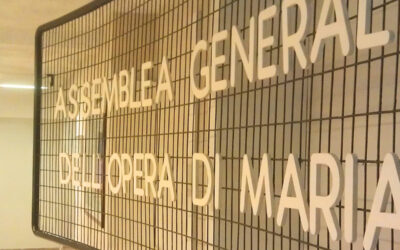 Seventy one students showed up atMariapolis Liain Argentina: from Mexico, Honduras, Guatemala, El Salvador, Costa Rica, Cuba, Colombia, Ecuador, Venezuela, Peru, Bolivia, Paraguay, Chile, Italy and Argentina. It was an opportunity to spend nine days together and explore answers to some challenging questions.
Seventy one students showed up atMariapolis Liain Argentina: from Mexico, Honduras, Guatemala, El Salvador, Costa Rica, Cuba, Colombia, Ecuador, Venezuela, Peru, Bolivia, Paraguay, Chile, Italy and Argentina. It was an opportunity to spend nine days together and explore answers to some challenging questions.
The academic approach of Summer School 2014, promoted by Sophia University Institute and the help of some Latin American professors, examined several disciplines from a new viewpoint.
Biblical Theology. Exploration of the authenticity of Gospel texts brought out the revolutionary and transforming message of Jesus’ words.
Economic Sciences. Trust and reciprocity were shown to be helpfully important to economic performance.
Sociology. The human person and society in the historical sociological context, and in the Magisterial documents of the Church, beginning with the idea of gift and interculturalism.
 Latin America is calling for deep change: a return to its roots; a recognition of its wealth and the cultures of its first peoples; the challenge of social inequality; finding ways to transform its contrasting diversity into gift.
Latin America is calling for deep change: a return to its roots; a recognition of its wealth and the cultures of its first peoples; the challenge of social inequality; finding ways to transform its contrasting diversity into gift.
The Arts were celebrated as a valid way for promoting interculturalism, in a display of works from several countries and the concert Music of Hope: the world opening of the opera “Hablata Oblata Opus 265 by Costa Rican composer Mario Alfaguel. It is a combination of contemporary music with texts by Latin-American thinkers that delighted the audience. Students from the first Summer School presented 29 papers in seven academic areas, and 12 projects that demonstrated that it is possible to begin from a new paradigm: the culture of brotherhood.
Daniela from Chile presented a project titled: “The new look of knowledge in the field of health care: what the same and what is different in Mapuche medicine and traditional medicine. Comparing traditional medicine and indigenous peoples.”
 Christopher from Mexico presented his work titled: “Brotherhood between the lines: an approach for its use in Mexican political discourse”. He explains: “This project’s goal is to develop an analysis of the concept of brotherhood as an element of the present system of political discourse in Mexico.”
Christopher from Mexico presented his work titled: “Brotherhood between the lines: an approach for its use in Mexican political discourse”. He explains: “This project’s goal is to develop an analysis of the concept of brotherhood as an element of the present system of political discourse in Mexico.”
Carlos from Argentina: “We’re many, but we’re one. Today I feel as if Central America has become a land without borders, united from north to south by a single dream: universal brotherhood.”
They leave with great challenges ahead of them: to bring forward socially transforming projects in individual regions of the continent, which will be presented at the next Summer School in 2015.




0 Comments